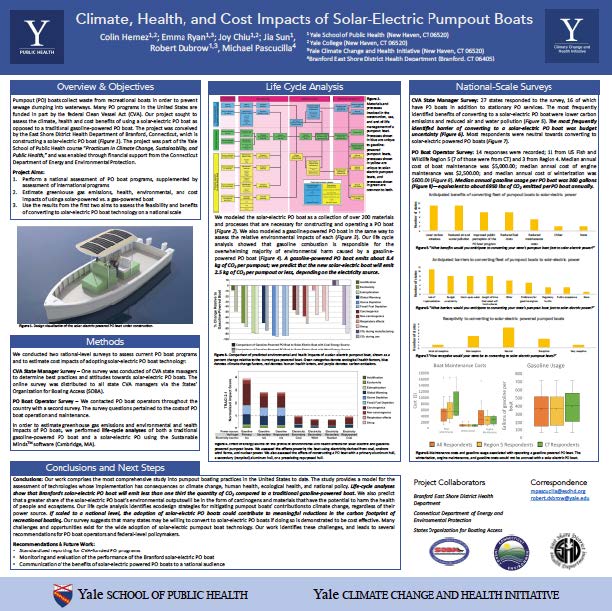Pump Out Boat Research Study: Climate, Health, and Cost Impacts of Solar-Electric Pump out Boats

ESDHD collaborated with the Yale School of Public Health to Study the efficiency, economic and environmental impact of using solar powered pump out boats to remove waste from recreational boaters.
Pump out (PO) boats collect waste from recreational boats in order to prevent sewage dumping into waterways. Many PO programs in the United States are funded in part by the federal Clean Vessel Act (CVA). Our project sought to assess the climate, health and cost benefits of using a solar-electric PO boat as opposed to a traditional gasoline-powered PO boat. The project was conceived by the East Shore District Health Department of Branford, Connecticut, which is constructing a solar-electric PO boat. The project was part of the Yale School of Public Health course “Practicum in Climate Change, Sustainability, and Public Health,” and was enabled through financial support from the Connecticut Department of Energy and Environmental Protection.
Project Aims:
1. Perform a national assessment of PO boat programs, supplemented by assessment of international programs
2. Estimate greenhouse gas emissions, health, environmental, and cost impacts of using a solar-powered vs. a gas-powered boat
3. Use the results from the first two aims to assess the feasibility and benefits of converting to solar-electric PO boat technology on a national scale"
Methods: Two national-level surveys were conducted to assess current PO boat programs and to estimate cost impacts of adopting solar-electric PO boat technology:
• CVA State Manager Survey – One survey was conducted of CVA state managers to determine best practices and attitudes towards solar-electric PO boats. The online survey was distributed to all state CVA managers via the States’ Organization for Boating Access (SOBA).
• PO Boat Operator Survey – We contacted PO boat operators throughout the country with a second survey. The survey questions pertained to the costs of PO boat operation and maintenance.
In order to estimate greenhouse gas emissions and environmental and health impacts of PO boats, we performed life-cycle analyses of both a traditional gasoline-powered PO boat and a solar-electric PO using the Sustainable MindsTM software (Cambridge, MA)."
Conclusions: Our work comprises the most comprehensive study into pump out boating practices in the United States to date. The study provides a model for the assessment of technologies whose implementation has consequences on climate change, human health, ecological health, and national policy. Life-cycle analyses show that Branford’s solar-electric PO boat will emit less than one third the quantity of CO2 compared to a traditional gasoline-powered boat. We also predict that a greater share of the solar-electric PO boat’s environmental outputs will be in the form of carcinogens and materials that have the potential to harm the health of people and ecosystems.
Our life cycle analysis identifies eco-design strategies for mitigating pump out boats’ contributions to climate change, regardless of their power source. If scaled to a national level, the adoption of solar-electric PO boats could contribute to meaningful reductions in the carbon footprint of recreational boating. The survey suggests that many states may be willing to convert to solar-electric PO boats if doing so is demonstrated to be cost effective.
Many challenges and opportunities exist for the wide adoption of solar-electric pump out boat technology. The work identifies these challenges, and leads to several recommendations for PO boat operators and federal-level policymakers.
